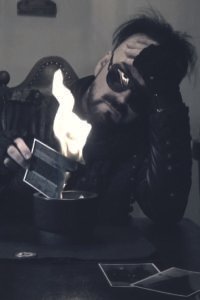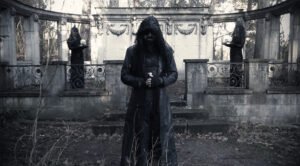Although Artaud Seth, alma máter of Merciful Nuns, has spent half his life studying the world of religions, the only faith he professes is that of Goth rock. Throughout twelve albums, he has pushed the boundaries of the genre, making it more cinematic or hardening its sound. Now, he is about to release Merciful Nuns’ thirteenth album, entitled Finistère, which promises to be a turning point in the band’s career. The band’s new tour is stopping at Santuario Festival, which will take place on November 15th, in Madrid.
 —Let’s start with the unavoidable question about GARDEN OF DELIGHT. Already in your first famous band, you got the ideas of concept albums and included a lot of religious stuff. How did you get the idea of the seven albums with seven songs? What was, according to you, the most accomplished of all the albums?
—Let’s start with the unavoidable question about GARDEN OF DELIGHT. Already in your first famous band, you got the ideas of concept albums and included a lot of religious stuff. How did you get the idea of the seven albums with seven songs? What was, according to you, the most accomplished of all the albums?
—Artaud: Next question please.
—In you first album with MERCIFUL NUNS, LIBER I, you said that you want to do was pure retro goth. But how did your vision change along the albums that you have been releasing with MERCIFUL NUNS?
—Artaud: At its core, it’s still pure goth rock — perhaps a bit more symphonic over the years. LIBER I was conceived from the idea of creating something that could have come straight out of – let’s say 1985. The instrumentation is stripped-down: deep vocals, a basement-deep bass, shimmering guitars, and a few choirs. The core essence remains, but it’s been broadened to give a bit more musical room to explore.
—From 2011 you 2013 you released six albums with MERCIFUL NUNS, that’s a lot specially if you consider how much work a MN album must imply. Was an inspired moment in your life?
—Artaud: Three albums, two Eps, one live dvd… well, I had a lot of ideas obviously.
—The both GOETIA albums are more atmospheric than the previous works, why did you go in this direction? Were you looking for a more cinematic sound?
—Artaud: The two GOETIA albums were created during a journey to the biblical sites in Israel and Jordan and are thematically connected. GOETIA V was completed first, and I thought that album was too “challenging,” too “different,” too “quiet” to stand on its own. So I wrote GOETIA IV as another album—one that would be a bit more accessible and include subtle reminiscences of LIBER I. GOETIA V is, in every respect, an extraordinary album in our history. It feels like a soundtrack for someone literally drowning in their faith, sinking to the bottom of a lake. This lake is the Sea of Galilee, the faith is Christianity, and the search for the Ark of the Covenant symbolically represents a search for the self. Here, the biblical context blends with the maelstrom of destruction that religions—especially Christian doctrine—can bring. This inner conflict is portrayed powerfully in GOETIA V, evoking a profound sense of spiritual helplessness.
—Your travels to Jordan, Mexico and India have been very important for the creation of your albums. Do you plan your travels as research for the albums or are the albums born after you got inspired during the travel?
—Artaud: In fact, the concept only really takes shape during the journey itself. Of course, I already had an idea beforehand of why I wanted to travel to a certain country, which culture I wanted to get to know, and which religion or belief system seemed worth studying. But in the end, it all blends together.
—Books, like the Kybalion, has been source for inspiration. Which others have been important to develop the concepts of the albums?
—Artaud: Books, manuscripts, temple inscriptions — anything can become a source of inspiration for writing. Often, the most intriguing aspects are hidden between the lines, or in the ways religious leaders have reshaped original texts. Interpretation itself is one of the greatest failings of the world’s religions. If people would return to their original scriptures, instead of bending them to suit personal interests or preserve power, the world would be a better place.
—Religions are one of your main subjects of your lyrics, how did the interest for them was born in you and when?
—Artaud: I suppose, as the grandchild of a Jehovah’s Witness, I’ve been deeply influenced by apocalyptic themes. Thx Granny.
—How has doing the research for the albums changed you?
—Artaud: It has made me a non-religious person at the end.
—Going back to your music; you said that EXOSPHERE was an important album for your way of doing arrangements. How did the work on this album changed your approach to arrangements?
approach to arrangements?
—Artaud: This album was one of the most important I have ever written. Its predecessor, GOETIA V, showed me that I am capable of arranging songs in such a way that they ultimately merge into one cohesive overall work of art. Since I have always been a fan of concept albums that captivate you from the first to the last second, this was very satisfying to me.
The key to this was a production technique: not recording songs one after another, but rather as part of a single process, a single project. This allowed me to maintain an overview of the entire work at all times, including transitions and the compatibility of the individual songs with one another. Also essential were the “exospheric” synth sounds on the album, which inspired me greatly and blended wonderfully in a floating way into the overall sound. Since I almost never use “preset sounds,” creating those “exospheric” synth sounds alone took months. It was worth it, and I still like to use them to this day. Just listen to the first few seconds of PASSING BELL and you’ll feel what I mean.
—Why ANOMALY, the 10th album was so difficult to finish?
—Artaud: It never felt finished. That’s why there are several significantly different versions of the album. I feel it lacks some of the flow within the album that I had set as a benchmark since EXOSPHERE. Still, the album contains some fantastic songs like BLUE LODGE and THE PYRAMID. The latter was written under the circumstances of the death of one of our lodge members, Frater Fidens, and to this day it serves as a memorandum to him from us.
—Why did you decide to end the project with the tenth release?
—Artaud: I’ve been asking myself the same question lately. At the time, I genuinely believed I had nothing left to say. I felt exhausted and empty — ten albums seemed like a good place to stop. So I began searching for a new concept, and that’s when I discovered KVLTAN.
—With KVLTAN you managed to reinvent the sound of the band; even after ten albums you managed to surprise your listener with new ideas. Did the work in your others project help this reinvention of the sound of the band?
—Artaud: No, that has nothing to do with it. I was simply fascinated by the KVLTAN concept. The three albums — KVLTAN, ONEIRONAUTS, and now FINISTÈRE — are designed as concept works, yet they don’t follow a strict linear narrative. Instead, they form a kind of mosaic: each song is a splinter, a fragment of a greater revelation. Only when all three albums are considered together does the complete image unfold. At the core stands the story of KVLTAN — our attempt to reinterpret the origins of humanity and the divine. It is not a fixed doctrine, but a possible theory, an ancient memory from which an entire cosmology can emerge.
—From ONEIRONAUTS, there is a new guitar player in the band, Jacques Moch. You said that you gave him more space. How has he changed the sound of the band?
—Artaud: Not really. But he’s a far better guitar player than I am. He refines and elevates my ideas, and that’s something I really appreciate about him!
 —And talking about the last member of the band, Jawa has been with you since the days of GARDEN OF DELIGHT and played in most of your projects. How would you define her contribution to the sound of MERCIFUL NUNS?
—And talking about the last member of the band, Jawa has been with you since the days of GARDEN OF DELIGHT and played in most of your projects. How would you define her contribution to the sound of MERCIFUL NUNS?
—Artaud: For me, she’s a living legend. Her bass playing is incredibly solid, and most importantly: she loves me and everything I create musically.
—FINISTÈRE is the name of your next album, to be released in November. Recently you have considered it your best album. What can you tell us of it?
—Artaud: You’re probably thinking, of course, the latest album is always the favorite and with some distance that usually changes. Nope, that’s not the case. FINISTERE, the end of the world, the Latin FINIS TERRAE, will undoubtedly be the pinnacle of my work. Everything really fits here: the flow within the album, the songs, the concept, the wonderful artwork, the mood… the feeling of farewell, grief, loss… never boring for a second and always surprising. On one hand, there’s the landscape of ‘Finistère’—this wild, archaic coastline in the far northwest of France, where the land breaks and the sea begin. But ‘Finistère’ also literally means ‘the end of the world.’ When you stand on that coast, you can feel a boundary—not just a geographical one, but an existential one. It’s as if the world becomes thinner there, as if the veil between the spheres begins to tear.
While writing the songs, I didn’t have a literal apocalypse in mind, but rather this feeling of transition, of being at a threshold: between light and darkness, land and water, the here and the beyond. The monochrome atmosphere—the cold grey, the wind, the vastness—felt like a gateway to something older, deeper. And of course, the name also carries the play on the German word ‘finster’ (dark), which I intentionally embraced. Finis Terrae is not just a place; it’s a state of consciousness.
—Do you think that FINISTÈRE will be the end of MERCIFUL NUNS or is it possible that we will have more albums? You said after the release of the tenth album that you felt like going in circles, do you feel the same again?
—Artaud: In some ways, it feels much like it did after the tenth album, ANOMALY — and yet, at the same time, it’s different. It’s not that I’ve run out of inspiration; rather, it feels as though I’ve created a summit, a moment after which nothing greater can follow. That said, I’m not declaring another farewell — that would be rather absurd by now. But yes, this might be the final MERCIFUL NUNS album. And if so, it would be a fitting and dignified ending.
—Your last video was banned from YouTube. What was the reason?
—Artaud: I’d really like to know. Allegedly, the video is ‘religiously offensive.’ Yet there’s nothing in it that could be considered offensive from a religious standpoint. It’s about the world of the living and the hereafter, and the fact that these two realms cannot connect. They haven’t outright blocked the video, but they’ve forbidden us from promoting it, and naturally, its reach has been heavily restricted. Soon after, I discovered that Apple Music had either deleted several of our ‘explicit’ songs or imposed age restrictions. Is it possible that the Americans are conducting some kind of strange crusade?
—How is Solar Lodge, your label going?
—Artaud: Fine. Best idea I ever had.
—How are the lodges that you created going? How would you describe them to our readers that maybe are not that familiar with them?
—Artaud: The Lodges’ primary objective is to serve as a localised mouthpiece for the MERCIFUL NUNS; they currently number is 21 in 21 countries; in this format a rather unique concept indeed. Lately, we haven’t really paid much attention to our lodges. Perhaps we should start focusing on them again. Today, it’s much easier to operate through a main lodge, the Solar Lodge, to reach our followers. Still, having direct contacts in each country remains a good idea.
What can we expect of your concert at Santuario? Artaud:
—No parties, no posing, no trivialities. A pure, occult musical ritual awaits.


